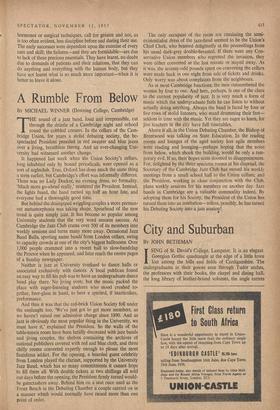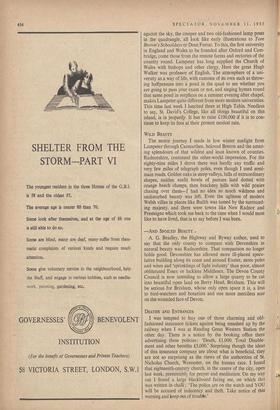City and Suburban
BY JOHN BETJEMAN ISING of St. David's College, Lampeter. It is an elegant Georgian Gothic quadrangle at the edge of a little town lost among the hills and fields of Cardiganshire. The undergraduates in their gowns seen through Tudor arches, the professors with their books, the chapel and dining hall. the long library of leather-bound volumes, the angle turrets against the sky, the creeper and two old-fashioned lamp posts in the quadrangle, all look like early illustrations to Tom Brown's Schooldays or Dean Farrar. To this, the first university in England and Wales to be founded after Oxford and Cam- bridge, come those from the remote farms and rectories of the country round. Lampeter has long supplied the Church of Wales with bishops and other clergy. Here the great Hugh Walker was professor of English. The atmosphere of a uni- versity as a way of life, with customs of its own such as throw- ing halfpennies into a pond in the quad to see whether you are going to pass your exam or not, and singing hymns round that same pond in surplices on a summer evening after chapel, makes Lam peter quite different from more modern universities. This time last week I lunched there at High Table. Needless to say, St. David's College, like all things beautiful on this island, is in jeopardy. It has to raise £100,000 if it is to con- tinue to keep its fees at their present modest rate.
WILD BEAUTY
The motor journey I made in low winter sunlight from Lampeter through Carmarthen, beloved Brecon and the amaz- ing splendours of that wildest and least known of counties, Radnorshire, continued the other-world impression. For the eighty-nine miles I drove there was hardly any traffic and very few miles of telegraph poles, even though I used semi- main roads. Golden oaks in steep valleys, hills of extraordinary shapes, sudden sunlit bowls of pasture land dotted with orange beech clumps, then brackeny hills with wild ponies chasing over them—I had no idea so much wildness and undisturbed beauty was left. Even the ugliness of modern Welsh villas in places like Builth was tamed by the surround- ing majesty, and there were towns like New Radnor and Presteigne which took me back to the time when I would most like to have lived, that is to say before I was born.
—AND SPOILED BEAUTY - A. G. Bradley, the Highway and Byway author, used to say that the only county to compare with Devonshire in natural beauty was Radnorshire. That comparison no longer holds good. Devonshire has allowed more ill-placed specu- lative building along its coast and around Exeter, more poles and wires and 'sprinklings of light industry' than poor, almost obliterated Essex or luckless Middlesex. The Devon County Council is now intending to allow a large quarry to be cut into beautiful open land on Berry Head, Brixham. This will be serious for Brixham, whose only open space it is, a loss to bird-watchers and botanists and one more merciless scar on the wounded face of Devon.
DEATHS AND ENTRANCES I was tempted to buy one of those charming and old- fashioned insurance tickets against being smashed up by the railway when I was at Reading Great Western Station the other day. There is a notice by the booking office there advertising these policies : 'Death, £1 ,000. Total Disable- ment and other benefits £5,000.' Surprising though the ideas of this insurance company are about what is beneficial, they are not so surprising as the views of the authorities of St. Nicholas Church, Worcester, on the human race. I found that eighteenth-century church, in the centre of the city, open last week, presumably for prayer and meditation. On my way out I found a large blackboard facing me, on which this was written in chalk : 'The police are on the watch and YOU will be accused of indecency and theft. Take notice of this warning and keep out of trouble.'



































 Previous page
Previous page